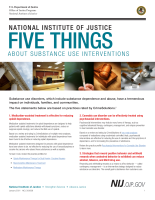Randomized controlled trials
Predictable Policing: Measuring the Crime Control Benefits of Hot Spots Policing at Bus Stops
Short-Term Effects of Restorative Justice Conferences on Post-Traumatic Stress Symptoms Among Robbery and Burglary Victims: A Randomized Controlled Trial
TASER Exposure and Cognitive Impairment: Implications for Valid Miranda Waivers and the Timing of Police Custodial Interrogations
Assessing Implementation and Effects Associated with a Comprehensive Framework Designed to Reduce School Violence: A Randomized Controlled Trial
A Randomized Controlled Trial of MTSS-B in High Schools: Improving Classroom Management to Prevent EBDs
Preparing Mediators to Mediate Cases Reporting High IPV in a Randomized Controlled Trial: The Importance of a Mediation Manual, Training, and Consultation
Comprehensive Gang Model Evaluation: Integrating Research Into Practice
Five Things About Substance Use Interventions
Desistance From Crime: Implications for Research, Policy, and Practice
Most scholars would agree that desistance from crime – the process of ceasing engagement in criminal activities – is normative. However, there is variability in the literature regarding the definition and measurement of desistance, the signals of desistance, the age at which desistance begins, and the underlying mechanisms that lead to desistance. Even with considerable advances in the theoretical understanding of desistance from crime, there remain critical gaps between research and the application of that research to practice.
See the YouTube Terms of Service and Google Privacy Policy




